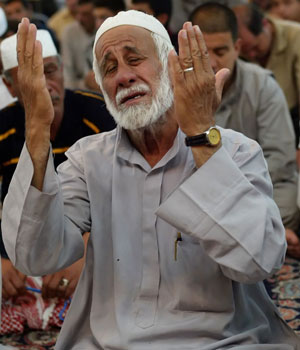
An Iraqi Sunni man raises his arms during weekly Friday noon prayer at the Abu Hanifa mosque in Baghdad, 21 April 2006 (AFP)
BAGHDAD,(Reuters) – Jawad al-Maliki, who is almost certain to be Iraq’s new prime minister, may gain the respect of many Iraqis with his tough decision-making but he will have to shake off his hardline Shi’ite image to unite the country.
Maliki, a top official in Iraq’s oldest Islamist party, was nominated by the Shi’ite Alliance on Friday to head the next government after his close ally Ibrahim al-Jaafari caved in to pressure from Kurds and Sunnis to step aside.
Unlike the soft-spoken Jaafari, Maliki is seen as a decisive figure in a country where many Iraqis say only a strong man can lead them.
But like all Iraqi politicians, he offers no magic solution to the security crisis, economic malaise and sectarian carnage that has raised fears of open civil war.
Maliki’s years in the Dawa party fighting former President Saddam Hussein may give him the endurance to guide Iraq through political minefields. But that may not be easy for a man accused of sectarianism.
Still, sensitivities have never stopped him for speaking out against Kurds, Sunnis, U.S. troops, and even members of his own Dawa party, which is part of the United Iraqi Alliance.
To win over Iraqis, he faces the task of demonstrating that his long years in exile will not prevent him from measuring Iraq’s complex pulse.
Maliki, who escaped a death sentence handed down by Saddam, spent years in neighbouring Syria, and some time in Iran, after fleeing Iraq in 1980. He returned after the U.S.-led invasion in 2003 but did not appear in the spotlight like other politicians who some Iraqis described as people who rode in on American tanks.
Maliki emerged as a key behind-the scenes player, helping draft the contentious constitution and serving on a panel to purge Iraq of former members of Saddam’s Baath party.
Some Iraqi politicians say disbanding Iraq’s army in the crackdown on Baathist only bolstered the Sunni Arab insurgency so Maliki’s future policies on Baathists will be closely watched.
Born in the town of Hindiya in 1950, he headed a national defence committee in Iraq’s previous parliament and was instrumental in creating tough ‘anti-terrorism’ laws against the insurgency that are yet to be enforced.
They call for the execution of insurgents who kill Iraqis and those who finance and accommodate them, measures that some Iraqi leaders say will sabotage efforts to draw rebels into the political process.
Maliki, a father of five, received a Masters degree in Arabic literature.

Iraqi politician Jawad al-Maliki stands next to embattled Iraqi Prime Minister Ibrahim al-Jaafari during a news conference in Baghdad, April 22, 2006 (REUTERS)

Iraqi Shiites worship during weekly Friday noon prayers at the holy shrine of Imam Musa al-Kazem in Baghdad, 21 April 2006 (AFP)
